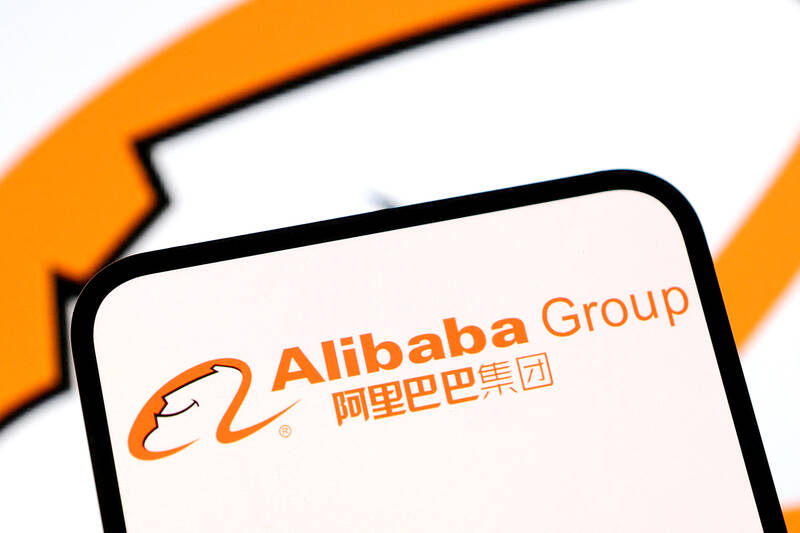The frenzy over Chinese artificial intelligence (AI) is turning Alibaba Group Holding Ltd (阿里巴巴) into an investor favorite again, injecting new life into an e-commerce giant that had nearly sunk into obscurity following a years-long regulatory crackdown.
Alibaba’s Hong Kong-listed shares have surged 46 percent since hitting a 2025 low on Jan. 13, expanding its market value by nearly US$87 billion and exceeding the Hang Seng Tech Index’s 25 percent gain in the same period. That makes the stock by far the best performer in China’s Big Tech universe in the new year, outshining rivals Tencent Holdings Ltd (騰訊), Baidu Inc (百度) and JD.com Inc (京東).
It marks a surprise reversal of fortunes for Alibaba, which had fallen out of favor among investors after its business suffered from Beijing’s clampdown on the country’s tech behemoths and a post-COVID-19 consumption slump. Behind the rally is optimism about Alibaba’s efforts to develop its own AI services and platform, which gained traction after Chinese AI start-up DeepSeek (深度求索) unveiled technologies that caused a rout on Wall Street.

Photo: Reuters
Alibaba’s shares got another shot in the arm yesterday, after The Information reported that Apple Inc is working with the e-commerce pioneer to roll out AI features in China.
“The emergence of DeepSeek has sparked a new AI-related catalyst for Chinese tech stocks,” said Andy Wong (黃耀宗), investment and ESG director for Asia Pacific at Solomons Group. “Within this space, we see Alibaba as having more tangible and well-established earnings growth prospects in the medium term.”
Since the advent of ChatGPT in late 2022, Alibaba has invested in a clutch of China’s most promising start-ups, including Moonshot (月之暗面) and Zhipu (智譜). The company prioritized the expansion of the cloud business that underpins AI development, slashing prices to win back the customers that fled to rivals during the turbulent years. It also decided to spend on AI, joining a race led by Baidu at the time.
Last month, that effort yielded initial fruit. Alibaba published benchmark scores showing its Qwen 2.5 Max edition scored better than Meta Platforms Inc’s Llama and DeepSeek’s V3 model in various tests. The company is now considered a leading player in AI alongside big names from Tencent to ByteDance Ltd (字節跳動) and start-ups including MiniMax (稀宇科技) and Zhipu.
But it’s still early days.
A key hurdle facing Chinese AI firms has been the slower adoption and lack of willingness to pay for services among domestic consumers and businesses.
“Many hedge funds and long-only investors see AI as a potential inflection point for Alibaba, with some expressing interest in understanding the valuation of Alibaba’s cloud business and any upside from large language models,” JPMorgan Chase & Co analysts including Alex Yao (姚橙) wrote in a note. “The AI narrative is seen as a driver for potential re-rating, but there are concerns about the monetization of AI capabilities.”
In addition, cloud business growth for Chinese hyperscalers has lagged that of major US peers so far. Analysts estimate cloud revenues for the December quarter rose 9.7 percent from a year ago at Alibaba and 7.7 percent at Baidu, compared with 19 percent at Amazon.com Inc and 31 percent at Microsoft Corp.
Alibaba’s financial results scheduled on Thursday next week are expected to offer investors a fresh opportunity to learn about the company’s progress on its AI models and outlook for its cloud services.

On Tuesday, US President Donald Trump weighed in on a pressing national issue: The rebranding of a restaurant chain. Last week, Cracker Barrel, a Tennessee company whose nationwide locations lean heavily on a cozy, old-timey aesthetic — “rocking chairs on the porch, a warm fire in the hearth, peg games on the table” — announced it was updating its logo. Uncle Herschel, the man who once appeared next to the letters with a barrel, was gone. It sparked ire on the right, with Donald Trump Jr leading a charge against the rebranding: “WTF is wrong with Cracker Barrel?!” Later, Trump Sr weighed

SinoPac Financial Holdings Co (永豐金控) is weighing whether to add a life insurance business to its portfolio, but would tread cautiously after completing three acquisitions in quick succession, president Stanley Chu (朱士廷) said yesterday. “We are carefully considering whether life insurance should play a role in SinoPac’s business map,” Chu told reporters ahead of an earnings conference. “Our priority is to ensure the success of the deals we have already made, even though we are tracking some possible targets.” Local media have reported that Mercuries Life Insurance Co (三商美邦人壽), which is seeking buyers amid financial strains, has invited three financial

Artificial intelligence (AI) chip designer Cambricon Technologies Corp (寒武紀科技) plunged almost 9 percent after warning investors about a doubling in its share price over just a month, a record gain that helped fuel a US$1 trillion Chinese market rally. Cambricon triggered the selloff with a Thursday filing in which it dispelled talk about nonexistent products in the pipeline, reminded investors it labors under US sanctions, and stressed the difficulties of ascending the technology ladder. The Shanghai-listed company’s stock dived by the most since April in early yesterday trading, while the market stood largely unchanged. The litany of warnings underscores growing scrutiny of

OUTLOOK: Among the six sub-indices, only the stock market confidence sub-index rose due to strong equity performance and expectations of a US Federal Reserve rate cut Consumer confidence weakened further this month, sliding to its lowest level in two-and-a-half years as households grew increasingly uneasy about the economic outlook, job security and big-ticket spending, a survey by the National Central University showed yesterday. The consumer confidence index fell 1.07 points from last month to 63.31, the weakest number since May 2023, said the university’s Research Center for Taiwan Economic Development (RCTED), which conducts the monthly poll. “Although the Directorate-General of Budget, Accounting and Statistics recently increased Taiwan’s GDP growth forecast for this year to 4.45 percent, consumer sentiment tells a different story,” RCTED director Dachrahn Wu